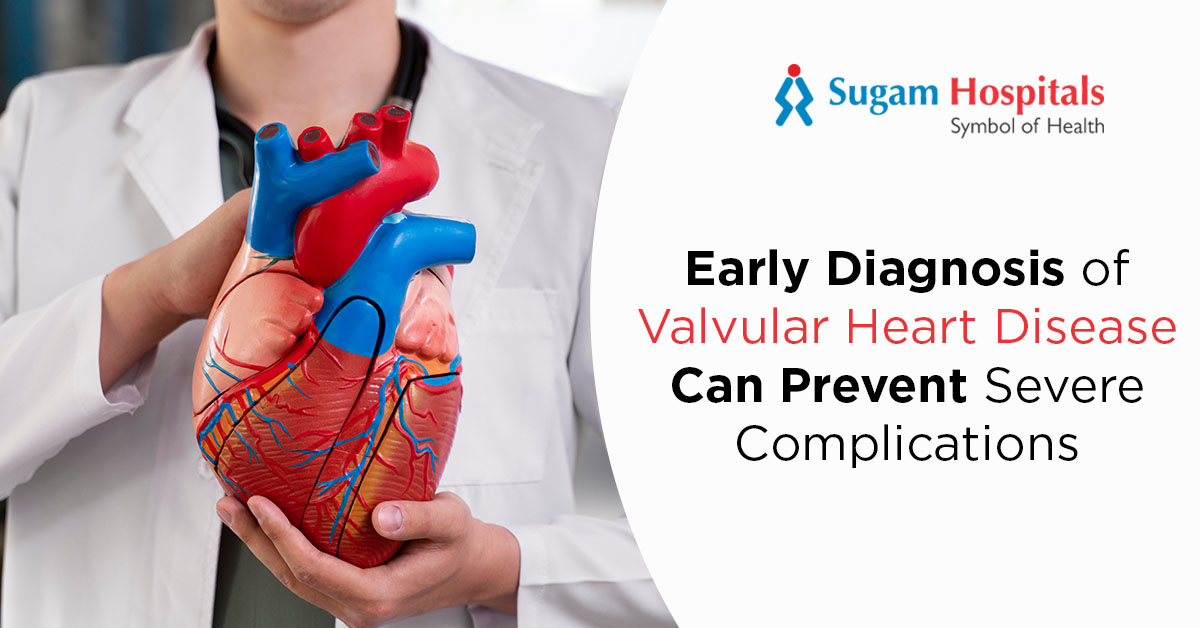Early Diagnosis of Valvular Heart Disease Can Prevent Severe Complications

Early Diagnosis of Valvular Heart Disease Can Prevent Severe Complications
November 21, 2025 by adminThe four valves in your heart mitral, tricuspid, aortic and pulmonary are the ones that keep blood flowing in the right way. When valves are healthy, they open and close without problems with every heartbeat. Valvular Heart Disease is a condition where one or more valves are improperly functioning. Some of the most common valve problems are stenosis, which is the narrowing of the valve opening regurgitation, when blood goes backward due to the valve not closing completely and prolapse, which is the pushing back of valve leaflets.
Any of these conditions make the heart pump harder thus increasing the chance of the heart becoming weak and less efficient in pumping blood. It is still possible, however, to spot it early enough to save the heart.
Common Causes Behind Valvular Heart Disease
Valvular heart issues may initially seem to come from a single source, but they can actually be triggered indirectly or directly by several factors listed in the following :
Congenital (Present at Birth): The valves of some people are defective from birth.
Age-Related Degeneration: In the course of life, the valves may become hard or covered with calcium, which is a condition that usually affects the aortic valve.
Rheumatic Fever: It is rare nowadays, but in the past, a strep infection that was left untreated could cause valve damage due to the inflammation it would bring.
Infections: Infective endocarditis is an example of a disease that can destroy the lining of the heart and the valves.
Other Heart Conditions: For example, with high blood pressure, heart attacks or heart failure, the heart chambers may become dilated and this may result in the valve malfunctioning.
Certain Medications: It is extremely infrequent that some particular drugs may be a source of valve problems.
Most of these are the cases in which prevention is possible or early management can be done, thus the absolute necessity of proper and regular cardiac check-ups.
Recognizing the Warning Signs: Why Early Diagnosis is Crucial
Valvular Heart Disease may cause delayed diagnosis as it can quietly progress for a long time. The initial phase of the disease, without or with very few symptoms, largely depends on the presence of the disease. The absence of these symptoms makes it necessary to pay great attention to regular check-ups.
The major symptoms of this disease include:
- Shortness of breath: Mainly during heavy work and laying flat.
- Fatigue/Weakness: Getting very tired after doing activities the usual way.
- Swelling (Edema): Measurable changes in the ankles, feet or belly area.
- Chest Pain or Discomfort: Usually accompanying physical activity.
- Heart Palpitations: A sensation of quick, strong or irregular heartbeat.
- Dizziness or Fainting: Mostly happen during exercise.
- Heart Murmur: A murmur found by a doctor that can indicate valve problems inside the heart.
Failure to take these symptoms into account may lead to disorders such as heart failure, stroke, blood clots and even sudden cardiac death. Identifying, comprehending and intervening at the time of these first signals can provide a better prognosis to a great extent.
The Power of Early Intervention: Diagnosis and Treatment
Stage one recognition essentially gives the patient the chance to receive treatment on time and in changing, this goes a long way in lowering the risk of a serious heart-related situation.
A diagnosis could be:
Check-up: Hearing the murmur of the heart with the help of a stethoscope.
Echocardiogram: A probe sends ultrasound waves to the heart to picture the valves and the condition of the heart.
ECG, chest X-ray, stress tests or cardiac catheterization to get more information about the condition
Treatment Approaches depend on severity:
Monitoring: In very mild situations, watching may be the only necessary action.
Medications: To alleviate the symptoms and stop the disease from further development, these may include measures for blood pressure control and diuretics.
Lifestyle Changes: Following a diet beneficial for the heart, doing exercises regularly and giving up smoking.
Surgical/Interventional Procedures: Valve repair or replacement through open-heart surgery or a less invasive method such as TAVR.
Besides saving the pumping capacity of the heart, early intervention is often a way to have less invasive procedures.
Your Heart Deserves Expert Care
Valvular Heart Disease is a life-threatening condition in which the earliest identification is the most efficient method of avoiding tragic developments. Symptoms such as tiredness, difficulty breathing or irregular heartbeat should not be disregarded.
Time consultation can be a great change. To get the expert evaluation, correct diagnosis and state-of-the-art treatment, come to Sugam Hospital, our reliable cardiology hospital in Chennai. Taking care of your heart today is the best way to have a fit and healthy life later.

